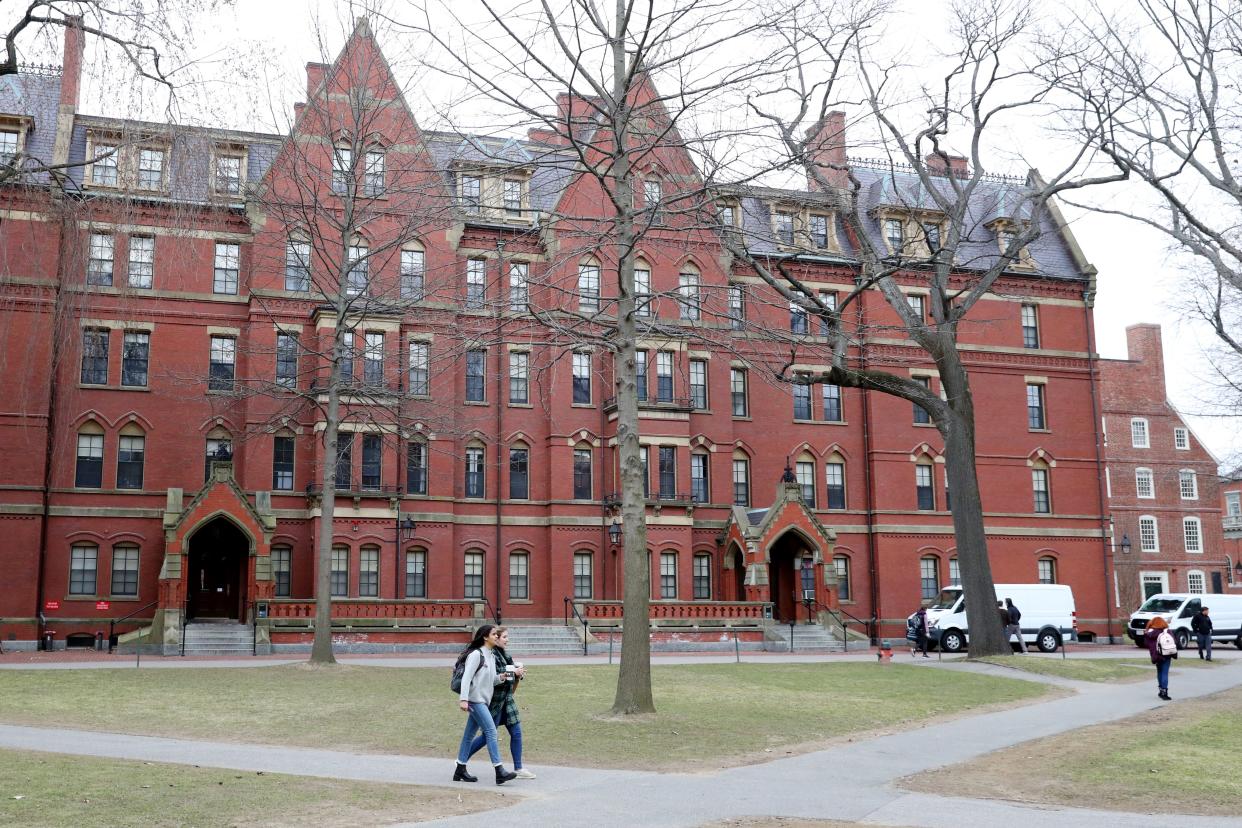Harvard announces $100M to fund efforts to redress its ties to slavery

Harvard University announced a $100 million fund Tuesday to redress its ties to slavery after a report found that the university's leaders enslaved more than 70 people in the 17th and 18th centuries.
The report, written by a committee appointed in 2019 by Harvard President Lawrence S. Bacow, found that "slavery thrived in New England from its beginnings," including at Harvard. Many who read the report will find it "disturbing and even shocking," Bacow said in a statement.
The university's president said the fund would go toward the recommendations in the report, which include efforts to improve educational opportunities for marginalized students and partnering with historically Black colleges and universities. It also recommended memorials, research opportunities and curricula that honor enslaved people and acknowledge the university's ties to slavery.
The report found that between the university's founding in 1636 and 1783, Harvard faculty, staff and leaders enslaved more than 70 people, many of whom worked and lived on campus.
"Slavery – of Indigenous and of African people – was an integral part of life in Massachusetts and at Harvard during the colonial era," according to the study's findings.
REVISITING HISTORY: Enslaved Angolans helped build the US. Now Angola hopes African Americans will visit
INTERNATIONAL AFRICAN AMERICAN MUSEUM: Charleston wharf where 100,000 enslaved Africans were imprisoned to become a museum
The university "had extensive financial ties to and profited from slavery in the 17th, 18th and 19th centuries," the report said.
Some donors had ties to slave trade through plantations in the South and Caribbean islands and through textile manufacturing operations in the North that were supplied by cotton grown by enslaved people.
In the first half of the 19th century, five men who made their fortunes from slavery made up more than one-third of the money donated or pledged to Harvard by private individuals.
"These donors helped the university build a national reputation, hire faculty, support students, grow its collections, expand its physical footprint and develop its infrastructure," the report said.
GEORGE MASON SLAVES: The people once enslaved by George Mason are now being honored on the university's campus
Harvard also memorializes benefactors with ties to slavery today through statues, buildings and professorships, the report found.
Several Harvard intellectuals, including presidents and prominent professors, promoted "race science" and eugenics from the mid-19th century into the 20th century, according to the report. Some conducted abusive and intrusive research that was used to justify slavery and racist ideologies.
The report also acknowledged that Harvard's museum collections include the remains of thousands of people of Indigenous and African descent who may have been enslaved.
In a statement, Tomiko Brown-Nagin, the committee's chair and a professor of constitutional law and history, urged students, faculty and staff to read the report as a means of "examining our past as well as our present."
"We cannot dismantle what we do not understand, and we cannot understand the contemporary injustice we face unless we reckon honestly with our history," said Brown-Nagin, who is also dean of the Radcliffe Institute for Advanced Study at Harvard.
HARVARD SUED: University accused of profiting from early photos of American slaves
FIGHT FOR RENTY AND DELIA: Descendants team up in fight over early photos of enslaved people
While the report expands on previous research on the ties between one of the nation's most prestigious universities and slavery, Harvard has also previously acknowledged some of these connections.
In 2016, Drew Gilpin Faust, the university's president at the time, publicly acknowledged that Harvard was "directly complicit in America’s system of racial bondage" and "indirectly involved through extensive financial and other ties," according to Tuesday's report. Faust also created a committee to investigate the university's connections to slavery.
Bacow said the report's findings serve as "guideposts" in efforts to "properly reckon with our past." He said he will appoint a committee to implement the report's recommendations and allow $100 million for these efforts.
The $100 million commitment is significant, but Harvard’s endowment grew to $53.2 billion in the 2021 fiscal year.
TEACHING HISTORY: Despite political pressure, US teachers lead complex history lessons on race and slavery
Many universities in recent years have started to evaluate their connections to slavery, some joining a group known as Universities Studying Slavery. The consortium, which is based at the University of Virginia, includes Harvard, and other colleges such as Brown, Georgetown, the University of Georgia and the University of North Carolina.
Brown was the first university among the Ivy League to formally acknowledge its ties to slavery, according to Tuesday's report. The university invested $10 million to support academic opportunities for K-12 students in Providence, Rhode Island. It also offered loan forgiveness opportunities for graduate students and fellowships to support slavery studies.
In 2019, Princeton pledged $27.6 million as reparations for its ties to slavery, and Georgetown announced a $400,000 reparations fund.
Recently, Johns Hopkins University revealed in 2020 that its namesake founder had enslaved at least four people. He had been thought prior to be an abolitionist.
WHAT IS EMANCIPATION DAY?: What to know about the DC holiday commemorating slavery abolition
Contributing: Chris Quintana. Contact News Now Reporter Christine Fernando at cfernando@usatoday.com or follow her on Twitter at @christinetfern.
This article originally appeared on USA TODAY: Harvard puts $100M toward new fund to redress ties to slavery

